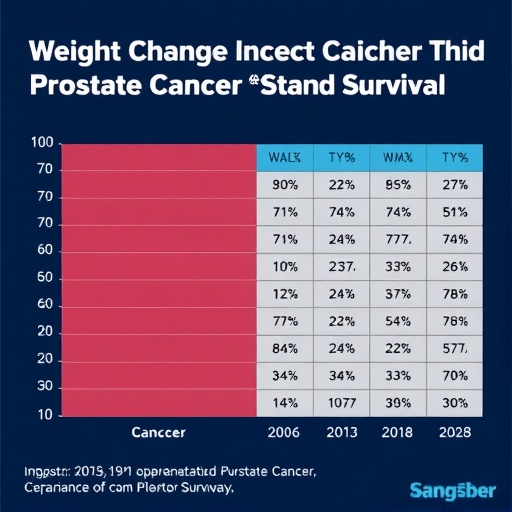In recent years, the impact of lifestyle and physiological changes on cancer outcomes has attracted increasing attention within the scientific community. One such area of focus is the relationship between weight fluctuations following a cancer diagnosis and subsequent survival rates. A new meta-analysis published in BMC Cancer provides compelling insights into how post-diagnosis weight changes affect survival outcomes in patients diagnosed with prostate cancer, a disease that remains a leading cause of cancer-related mortality among men worldwide.
The study comprehensively examines data from six longitudinal observational studies, encompassing over 12,000 men diagnosed with prostate cancer. Researchers sought to quantitatively assess whether weight gain or weight loss after diagnosis correlates with prostate cancer-specific mortality (PCSM) and all-cause mortality. This approach harnessed the power of meta-analytic techniques to synthesize diverse research findings, aiming to overcome prior inconsistencies and contradictory conclusions in the literature.
Weight changes were assessed both as relative percentage changes from baseline weight at diagnosis or treatment initiation, and as absolute kilogram changes recorded over defined time periods. Such methodological rigor allowed the meta-analysis to capture various dimensions of weight fluctuation, acknowledging the heterogeneity inherent in clinical measurements and study designs. To address this diversity, a random-effects model was employed, accommodating variability across studies and bolstering the reliability of the pooled results.
.adsslot_KdNhQRbu3B{ width:728px !important; height:90px !important; }
@media (max-width:1199px) { .adsslot_KdNhQRbu3B{ width:468px !important; height:60px !important; } }
@media (max-width:767px) { .adsslot_KdNhQRbu3B{ width:320px !important; height:50px !important; } }
ADVERTISEMENT
A striking revelation from the analysis was the differential impact of weight gain versus weight loss on patient outcomes. Patients who experienced weight gain following their cancer diagnosis exhibited a substantially higher risk of mortality, both from prostate cancer specifically and from all causes combined. Hazard ratios (HRs) indicated that weight gain was associated with a 23% increased risk of all-cause mortality and a 64% increased risk of prostate cancer-specific death, highlighting weight gain as a significant prognostic indicator.
Conversely, the relationship between weight loss and survival outcomes presented a more nuanced picture. While weight loss post-diagnosis was robustly linked to increased all-cause mortality—showing a 54% heightened risk—the connection to prostate cancer-specific mortality did not reach statistical significance. This divergence suggests that weight loss may signal broader health deteriorations or comorbid conditions influencing overall survival, without directly impacting prostate cancer progression or fatality.
Importantly, the findings held particular significance when the analysis focused exclusively on patients with localized or non-metastatic prostate cancer. Within this subgroup, both weight gain and weight loss maintained their association with increased all-cause mortality risk, underscoring the relevance of weight management even in earlier disease stages. This challenges assumptions that weight change effects might only manifest in advanced or metastatic cancer.
The absence of publication bias, as verified by Begg’s and Egger’s tests, adds credibility to the meta-analysis and suggests that the synthesized findings represent a true signal rather than selective reporting. The inclusion of multiple large-scale studies further strengthens the generalizability of the conclusions across different patient populations and clinical settings.
From a biological perspective, the mechanisms underpinning these associations invite further exploration. Weight gain may exacerbate inflammatory pathways, insulin resistance, and hormonal imbalances that promote tumor progression and metastasis. Excess adiposity is known to produce a pro-tumorigenic milieu through adipokines and cytokines, potentially accelerating prostate cancer aggressiveness and reducing treatment efficacy.
On the other hand, unintended weight loss in cancer patients often reflects systemic effects such as cachexia, sarcopenia, or comorbid illnesses, which can ultimately compromise overall health and survival independent of tumor-specific factors. Differentiating between intentional and unintentional weight loss is critical but remains challenging in observational research, posing a limitation for definitive causal inferences.
The observational nature of the included studies restrains the ability to unequivocally determine causality. Residual confounding factors, such as physical activity levels, diet quality, comorbidities, and treatment modalities, could influence both weight dynamics and mortality risk. Therefore, prospective interventional studies are warranted to elucidate whether targeted weight management post-diagnosis can improve survival and quality of life for prostate cancer patients.
Nevertheless, this meta-analysis contributes vital evidence that weight monitoring should integrate into prostate cancer patient care pathways. Oncologists and allied health professionals might consider individualized strategies to prevent excessive weight gain or debilitating weight loss during and after treatment, potentially enhancing prognostic outcomes.
This research also invites broader implications for survivorship care, emphasizing the importance of holistic health maintenance beyond oncologic control. Nutritional counseling, tailored exercise programs, and psychosocial support represent actionable avenues to mitigate adverse weight changes and optimize patient well-being.
In sum, the study illustrates that weight changes following prostate cancer diagnosis are far from mere incidental variations; they constitute meaningful biomarkers of prognosis. As the field moves towards precision oncology and personalized medicine, incorporating weight-related parameters could refine risk stratification and management paradigms.
Future investigations may expand upon these findings through randomized controlled trials, mechanistic studies, and integration of advanced biomarker profiling to uncover pathways linking adiposity and cachexia to tumor biology. Unraveling these connections holds promise for novel therapeutic targets and improved survivorship outcomes.
Ultimately, this meta-analysis reinforces the growing recognition of metabolic health as a cornerstone of cancer care, advocating for multi-disciplinary interventions that address not only the tumor but the whole patient.
Subject of Research: The impact of post-diagnosis weight changes on survival outcomes in prostate cancer patients.
Article Title: Weight gain or loss after diagnosis and survival outcomes in prostate cancer: a meta-analysis
Article References:
Cui, F., Zhang, Y., Tang, X. et al. Weight gain or loss after diagnosis and survival outcomes in prostate cancer: a meta-analysis. BMC Cancer 25, 1286 (2025). https://doi.org/10.1186/s12885-025-14704-w
Image Credits: Scienmag.com
DOI: https://doi.org/10.1186/s12885-025-14704-w
Tags: all-cause mortality in cancer patientscancer survival rates and weight managementcancer-related mortality among menimpact of lifestyle on cancer outcomeslongitudinal observational studies on cancermeta-analysis of prostate cancer studiespost-diagnosis weight fluctuationsprostate cancer-specific mortalityrole of physiological changes in cancerweight changes and prostate cancer survivalweight gain and cancer prognosisweight loss effects on prostate cancer





